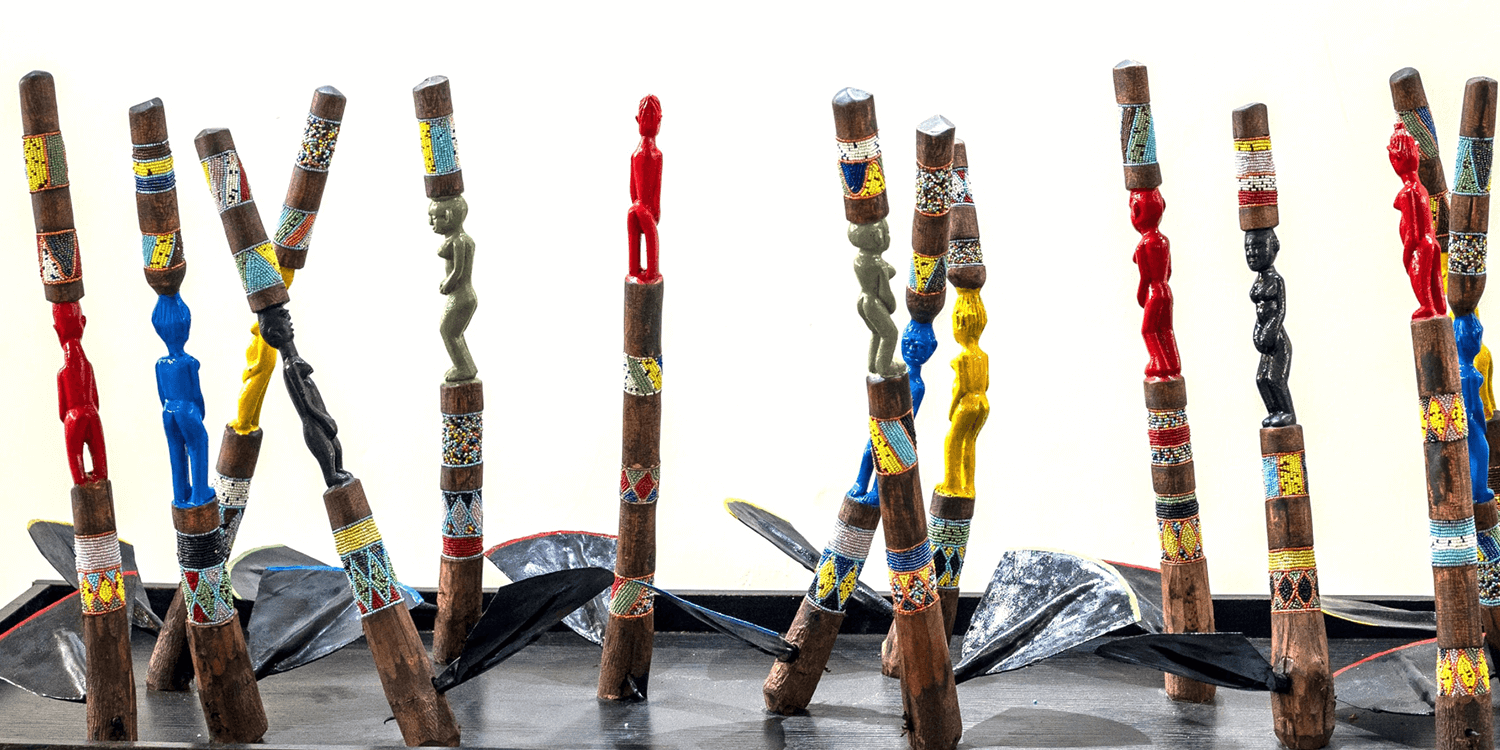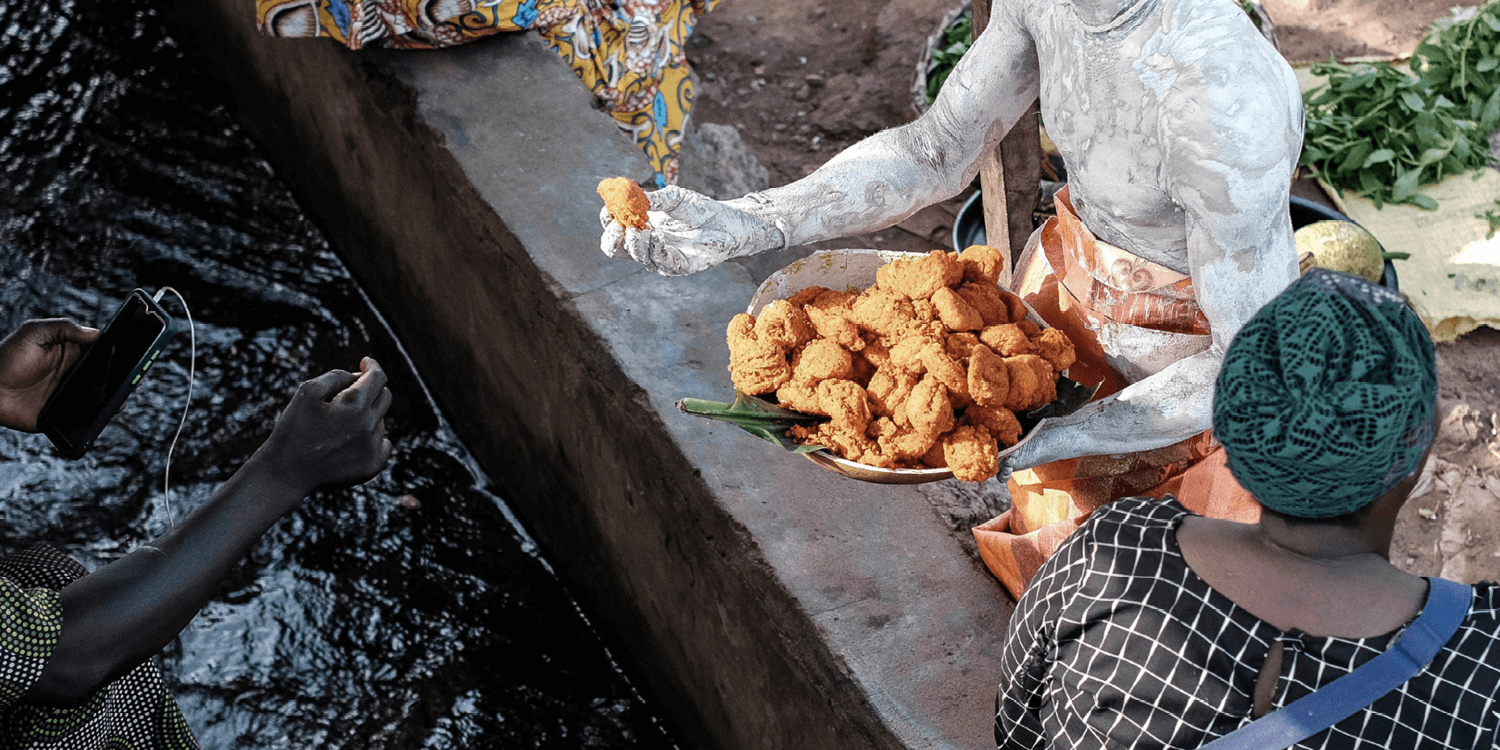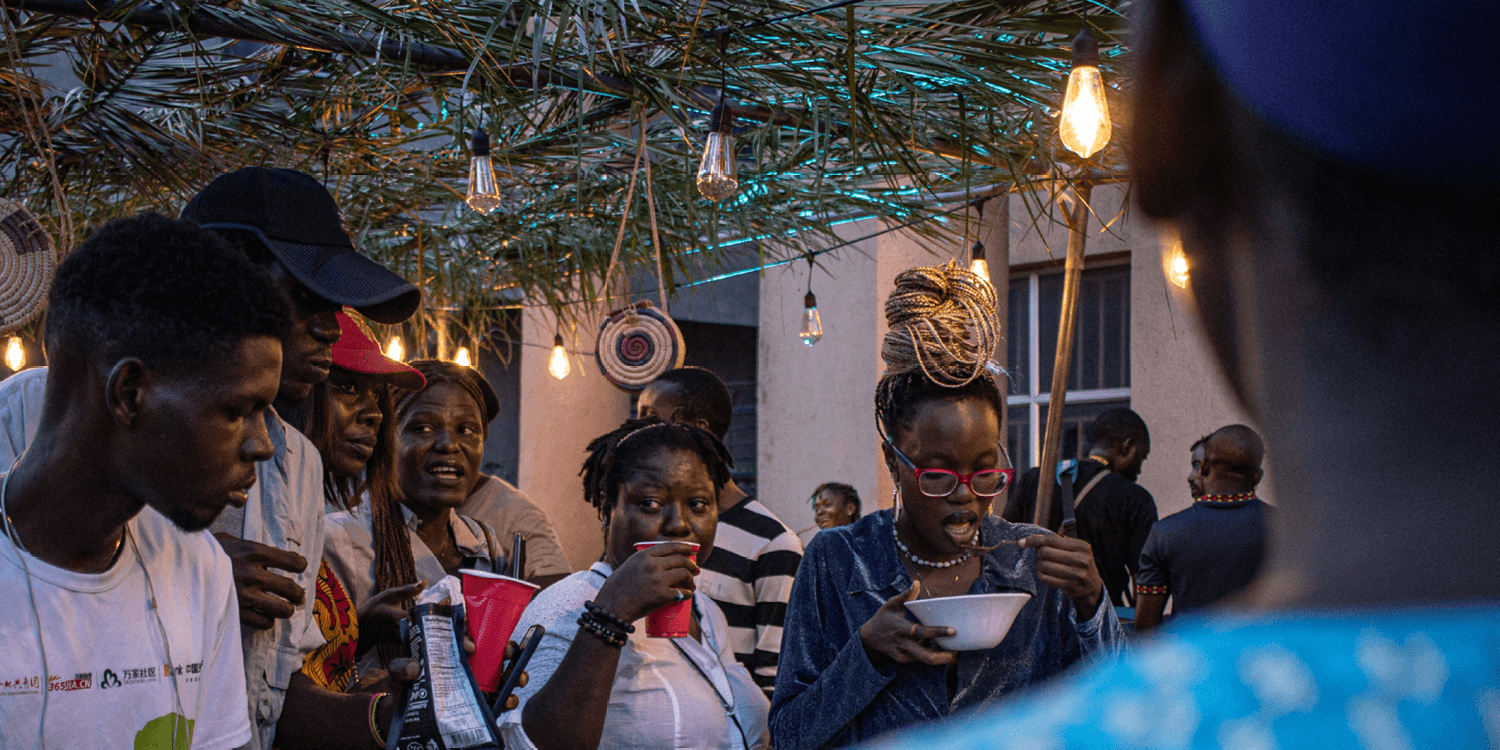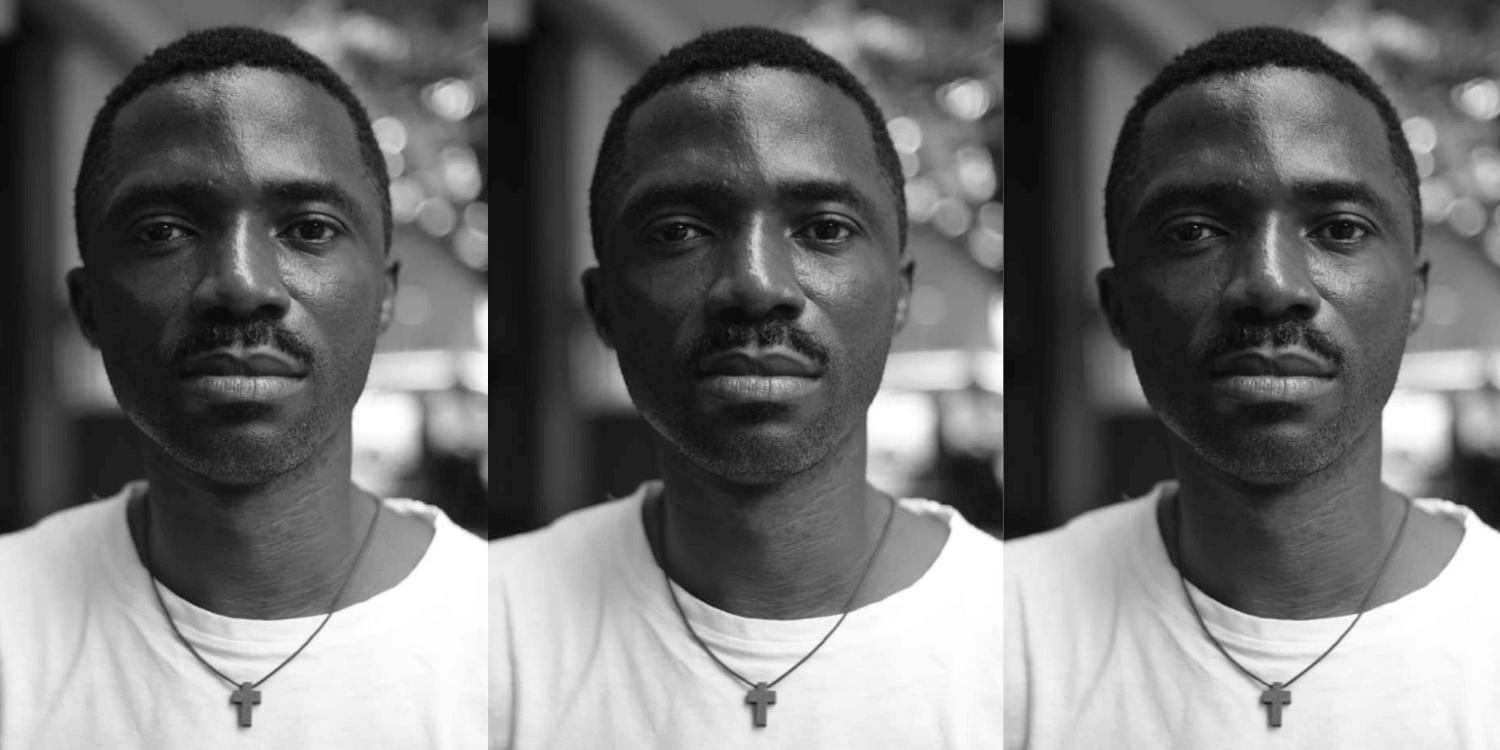We are excited to welcome Nigerian interdisciplinary artist Olufela Omokeko for an eight-week residency at G.A.S. Foundation. His practice spans performance, installation, photography, video, and research, often engaging deeply with communities to address urgent sociocultural issues. Through his work, he explores the intersections of personal and collective experience, with recurring themes of psycho-social dynamics, mortality, food insecurity, preservation, and ecological challenges.
During the residency, Olufela will spend time at G.A.S. Lagos and the G.A.S. Farm House in Ikiṣẹ to deepen his exploration of Yoruba agricultural identity and develop Àgbàlá Ọkọ́ - Hoe Courtyard, an interactive sculpture as part of his ongoing Mobile Food Museum project, which challenges the extinction of local food culture and honors traditional farming knowledge through a multi-sensory experience. Drawing from Ebenezer Obey’s 1976 song Operation Feed the Nation, he hopes to transform the hoe, a key Yoruba agricultural tool, into an artistic element that honors and elevates farmers’ cultural presence. In Lagos, he intends to conduct archival research at the G.A.S. Library and Picton Archive, and connect with traditional carvers, and local performance groups. At the Farm House, Olufela looks forward to conducting immersive fieldwork within Ijebu farming communities, where he will investigate the cultural and symbolic importance of the hoe and gather oral histories, farm poetry, and Oriki (praise poetry). He also hopes to visit the International Institute of Tropical Agriculture (IITA), Olusegun Obasanjo Presidential Library, and the National Archives to study pre-colonial farming records.
 Hoe Courtyard Series (Aiyetoro - field of gold, river of black) 2025. Image courtesy of Anthony Monday.
Hoe Courtyard Series (Aiyetoro - field of gold, river of black) 2025. Image courtesy of Anthony Monday.
What is the current focus of your creative practice?
The current focus of my creative practice is to interrogate urgent sociocultural issues in our fragmented society through a multimedia approach combining performance, installation, photo-video art, and social art practice. Since transitioning to full-time practice in 2019, following my alternative art education with the Vernacular Art-space Laboratory Foundation in Lagos, I have been deeply invested in exploring the intersection of personal and collective experiences—particularly around themes such as psycho-social dynamics, mortality, food insecurity, preservation, and ecological challenges.
I am currently expanding this practice through projects such as Aiyetoro: Field of Gold and Rivers of Black—supported by the Goethe Institute—and Jeun Soke, which utilize indigenous narratives of the Yoruba, particularly the Ilaje tribe, to investigate the complexities of migration, food systems, sustainability, and communal resilience. At the core of my work is a commitment to blending organic and contemporary media while actively engaging communities as collaborators and audiences. Through this, I aim to create art that functions both as critical commentary and as a catalyst for dialogue, cultural preservation, and potential solutions to social challenges.
What drew you to apply for this residency and how do you think it will inform your wider practice?
I was drawn to apply for this residency because its ethos aligns with my interdisciplinary practice. Since fully committing to my art in 2019, I have explored the intersection of personal and collective experiences in my community, focusing on resilience, food insecurity, violence, and cultural identity amid rapid urban and ecological change.
My recent projects, Ayetoro: Field of Gold, Rivers of Black, and Jeun Soke highlight the urgent need to reconnect communities with indigenous knowledge and sustainable solutions. The residency’s emphasis on experimental research, community-rooted practice, and cultural exchange offers an ideal space to deepen this work. It will provide time and resources to collaborate with new communities, transform agricultural tools into artistic and educational forms, develop my Mobile Food Museum project, and create interactive art that shifts public perceptions of local food culture and sustainability. Ultimately, this residency will strengthen my commitment to using art for cultural preservation and social transformation while opening new collaborative and archival pathways for my practice.
 Maami Dey Chop Akara (2024). Image Courtesy of Chris Iduma.
Maami Dey Chop Akara (2024). Image Courtesy of Chris Iduma.
Can you give us an insight into how you hope to use the opportunity?
During the residency, I will immerse myself in research, community engagement, and experimental creation to explore the cultural significance of agricultural tools and local food systems. I plan to work with farming communities, Yoruba poets, and cultural custodians to collect stories, Oriki (praise poetry), songs, and histories that reveal how tools like the hoe shape cultural identity. I will also visit woodcarving studios, welding workshops, the International Institute of Tropical Agriculture (IITA), and the National Archives in Ibadan to gather archival materials and deepen my understanding of farming traditions. In the studio, I will transform these findings into sculptural installations, adaptable farm objects, video works, and soundscapes as living archives.
I aim to develop Àgbàlá Ọkọ́ - Hoe Courtyard, an interactive installation celebrating farming heritage as cultural pride. This will include participatory projects with schools in Lagos and Ogun States, involving performances, exhibitions, and workshops with young farmers’ clubs to reconnect youth with agricultural traditions. Throughout the residency, I will document the process, creating an archive and methodology guide to benefit schools, museums, and communities beyond G.A.S. Ultimately, I seek to reimagine agricultural tools as dynamic artistic elements that foster cultural dialogue, knowledge exchange, and social transformation.
 Mobile Food Museum (Jeun Soke Project) 2024. Image courtesy of Lawal Oyewole.
Mobile Food Museum (Jeun Soke Project) 2024. Image courtesy of Lawal Oyewole.
RESIDENCY ARCHIVE
Event: Hoe Courtyard
Event Date: October 23rd, 2025
Nigerian interdisciplinary artist Olufela Omokeko, whose practice examines pressing sociocultural issues through performance, installation, photo-video art, and social practice, recently concluded an eight-week residency at the G.A.S. Farm House in Ikise. As his residency concluded, Olufela hosted Hoe Courtyard on October 3rd, 2025, welcoming fellow residents, G.A.S. staff, members of the local community, and collaborators who had contributed to his research. The event centred around a site-specific exhibition in which farm tools, market imagery and poetry were transformed into interactive sculptures. The installations spread throughout the Farm House’s living room and hallways, creating an immersive environment of sound, poetry, and tactile engagement, inviting guests to explore the complex relationships between sustenance, labour, and cultural memory.
 Guest gathered at the G.A.S. Farm House in Ikise for Hoe Courtyard on October 23rd 2025.
Guest gathered at the G.A.S. Farm House in Ikise for Hoe Courtyard on October 23rd 2025.
About Olufela Omokeko
Olufela Omokeko is an interdisciplinary Nigerian artist whose practice interrogates pressing sociocultural issues through performance, installation, photo-video art, and social practice. Since transitioning to full-time artistic work in 2019 following an alternative art education in Lagos, he has established himself as a compelling voice examining the intersection of personal and collective experience in contemporary Nigerian society. His work explores themes such as psycho-social dynamics, mortality, food insecurity, violence, and ecological challenges. This is evident in his solo exhibitions Masquerading Plastic (2019) and Ilarun (2019), noted for unconventional conceptual frameworks. His installation art pieces Son of Pepper Seller further his commitment to visual storytelling that centers Nigerian narratives. Olufela's recent project, Ayetoro: Field of Gold and Rivers of Black — his third Goethe-Institut grant — underscores this recognition. Working between organic and contemporary media, his practice combines deep community engagement with reflection on Nigeria’s evolving social fabric.
 Photo of Omokeko. Image courtesy of Damilare Adeyemi.
Photo of Omokeko. Image courtesy of Damilare Adeyemi.